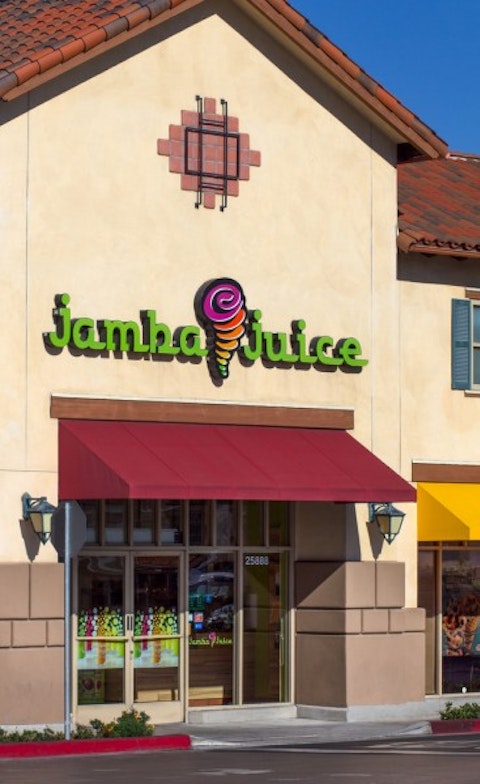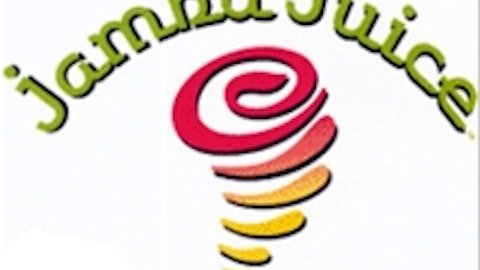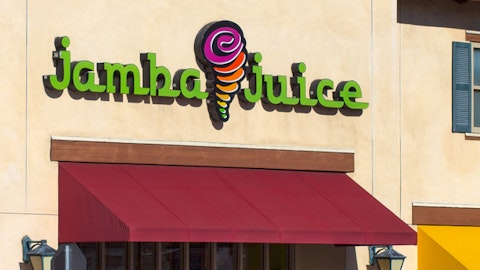Glenn W. Welling‘s Engaged Capital has been adjusting its stake in Jamba, Inc. (NASDAQ:JMBA) lately, and according to the most recent 13D filing of the fund, it now holds about 1.68 million shares, amassing about 10.4% of the company’s outstanding stock. Of these, 610,465 shares were purchased by Engaged Capital Master I for approximately $7,039,676 and 1,070,747 shares were acquired by Engaged Capital Master II for about $13,291,078. Welling himself directly owns about 2,851 shares and 3,000 unvested restricted stock as a board member of the company. The latest filing indicates that 43,898 shares were purchased on September 1 at an average price of just under $13.98 per share.

Ken Wolter / Shutterstock.com
Why do we pay attention to hedge fund sentiment? Most investors ignore hedge funds’ moves because as a group their average net returns trailed the market since 2008 by a large margin. Unfortunately, most investors don’t realize that hedge funds are hedged and they also charge an arm and a leg, so they are likely to underperform the market in a bull market. We ignore their short positions and by imitating hedge funds’ stock picks independently, we don’t have to pay them a dime. Our research have shown that hedge funds’ long stock picks generate strong risk adjusted returns. For instance the 15 most popular small-cap stocks outperformed the S&P 500 Index by an average of 95 basis points per month in our back-tests spanning the 1999-2012 period. We have been tracking the performance of these stocks in real-time since the end of August 2012. After all, things change and we need to verify that back-test results aren’t just a statistical fluke. We weren’t proven wrong. These 15 stocks managed to return 118% over the last 36 months and outperformed the S&P 500 Index by more than 60 percentage points (see the details here).
Follow Glenn W. Welling's Engaged Capital
Earlier this year, Engaged Capital and the $227.9 million specialty food and beverage company reached an agreement regarding the appointment of Mr. Welling as a Director and a member of the compensation and execution committee of the board. Jamba, Inc. (NASDAQ:JMBA)’s stock price has fallen by about 6.4% so far this year and 2.8% over the last 12 months. This doesn’t compare well with the restaurant industry’s average year-to-date gains of 12.26%, or its nearly 25% appreciation over the last year.
The hedge fund sentiment among those that we track at Insider Monkey concerning Jamba, Inc. (NASDAQ:JMBA) was mixed during the second quarter. Even though the total funds with investments in the company decreased to 11 at the end of June compared to 14 at the end of March, the aggregate investment increased to $70.77 million from $55.38 million during the same period, while the stock price rose by just a little over 2%. Engaged Capital is the largest stockholder of Jamba, Inc. (NASDAQ:JMBA) among these, and is followed by Indus Capital, which is managed by David Kowitz and Sheldon Kasowitz and holds about 1.3 million shares valued at $20.15 million. On the heels of Indus is Gregg J. Powers‘ Private Capital Management owning some 352,500 shares.
Jamba, Inc. (NASDAQ:JMBA)’s financial results for the second quarter didn’t help matters much, as the reported EPS of $0.19 was way lower than the projected $0.39, and revenues of $54.13 million missed the estimated mark by $1.27 million and marked a fall of 15.7% from the same quarter a year earlier. CEO James White blamed the unseasonably poor weather and reduced promotional activity for the company’s disappointing performance. There were some positive aspects about the quarter as well, such as the company managing to reduce its service speed to 3.1 minutes, which was the lowest in two years. Moreover, Jamba, Inc. (NASDAQ:JMBA)’s management also accelerated the execution of its plan to have more than 90% of the company’s stores franchised by the end of this year. The management expects the new model to drive up the company’s profitability, since the elimination of the hybrid franchise will significantly drive down the G&A cost as well as the capital expenditure in the coming year. Annual G&A cost is expected to fall in the $25 million to $26 million range by the end of 2016 as compared to $38 million two years ago. Similarly, annual capital expenditure is expected to fall from $8 million-to-$9 million to the $4 million-to-$6 million range.
Jamba, Inc. (NASDAQ:JMBA)’s Board of Directors also recently increased its share repurchase program to $45 million from $40 million. Since the authorization of the plan in November 2014 the company has already repurchased about $34.2 million worth of outstanding stock.
Disclosure: None

